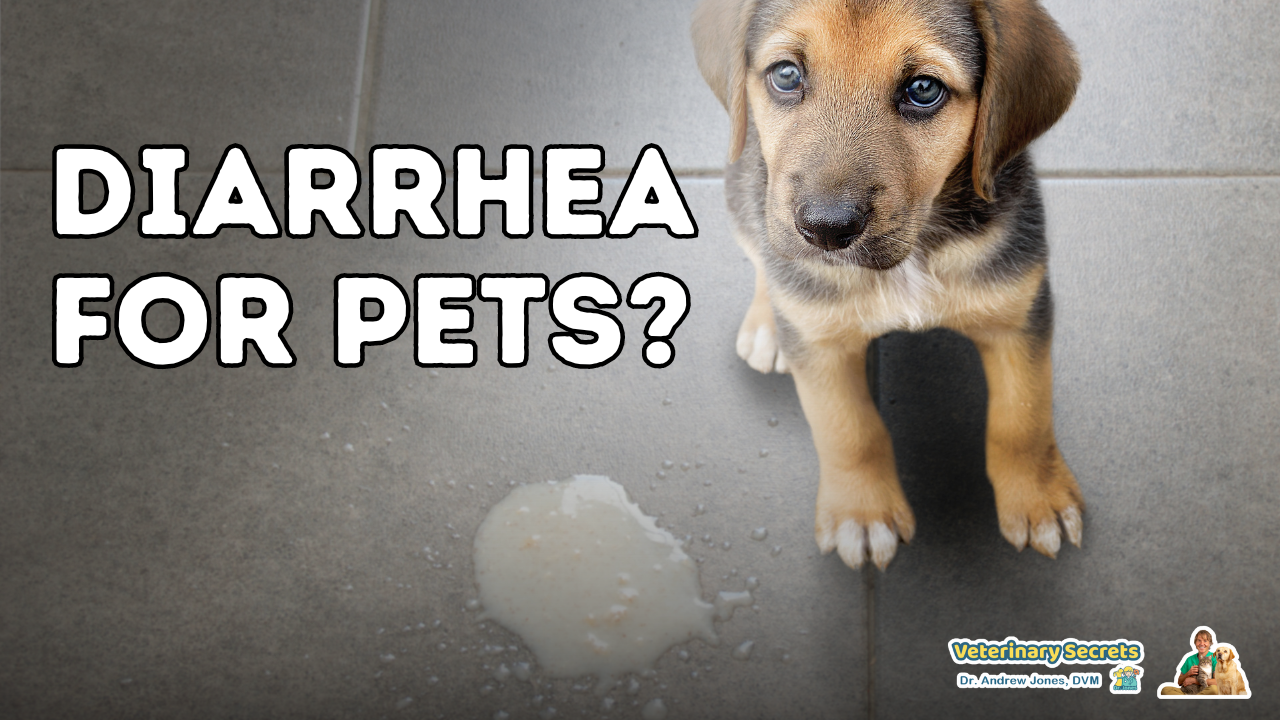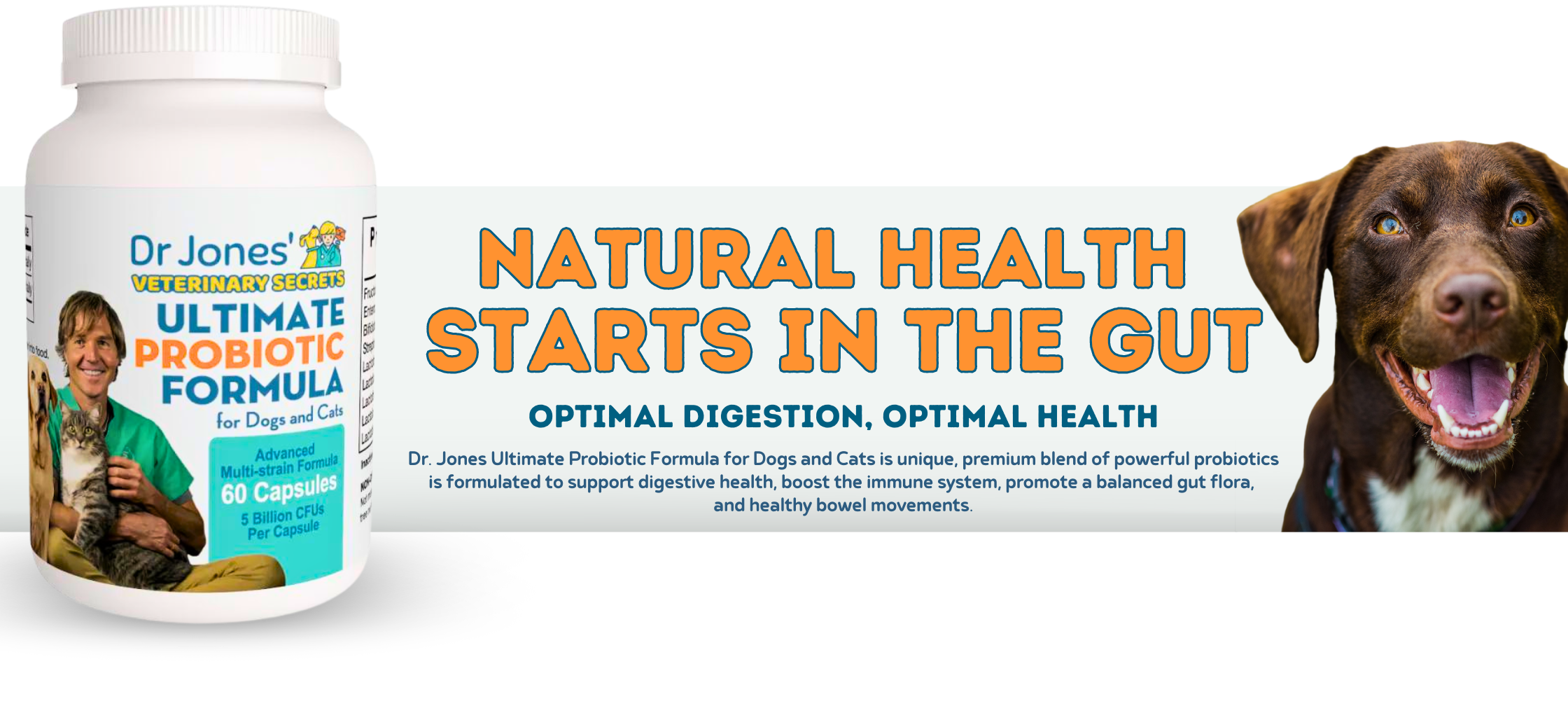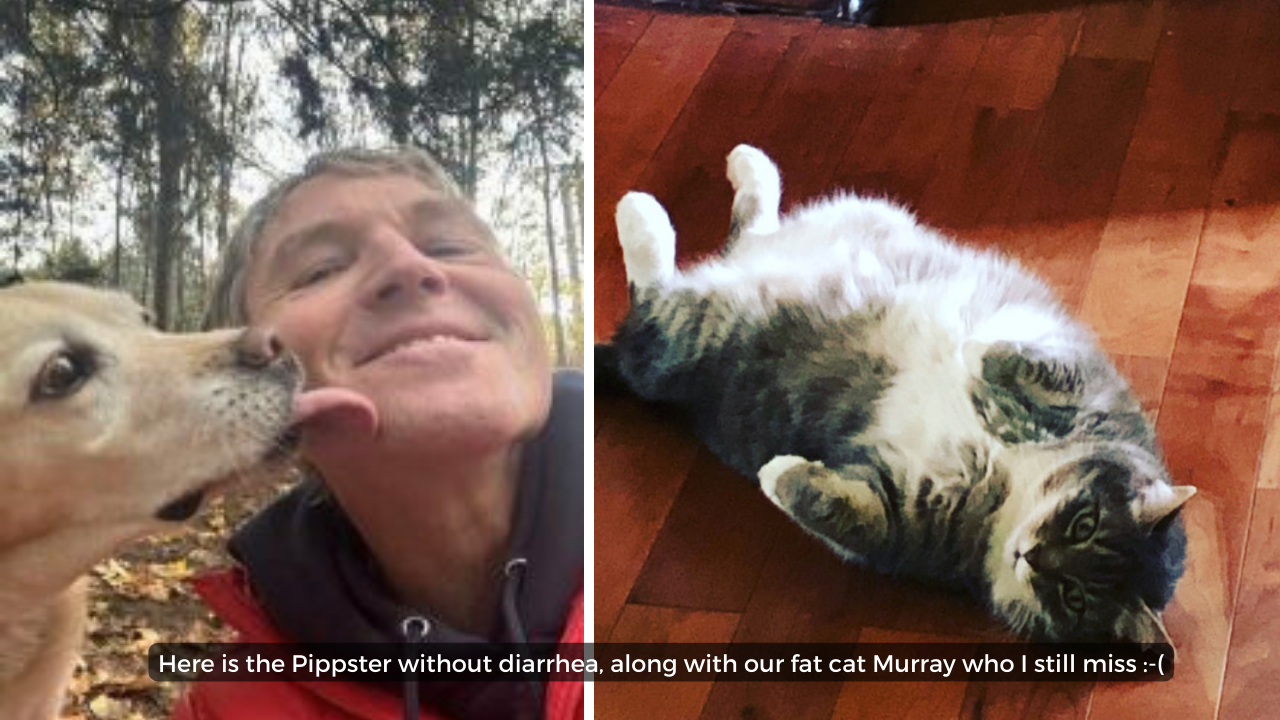Feeling something burst…diarrhea:-( Try these remedies!

While I was in practice, I inevitably saw many a dog with vomiting/diarrhea after most holidays involving food.
Too much Turkey/gravy etc. going to the dog 🙁
Our last cat Murray LOVED food, so at times he would eat the wrong thing, and end up with ughhh, diarrhea.
Pippi (the famous Lab) featured in many of my videos had a nasty bout of vomiting and diarrhea, (unrelated to a holiday), but if she was allowed, I am confident she would eat an entire turkey!
I used some of the following home remedies on both Murray and Pippi… one remedy in particular is key to helping PREVENT this in the 1st place, and that is probiotics.
These are the good bacteria that colonize the intestinal tract, and they are in our key dog and cat supplements (plus many other awesome ingredients to keep your pets healthy and away from the vet!!)
Boost Your Pet’s Digestive Health Today – Shop Our Probiotics Now
Dr. Jones’ Ultimate Probiotic Formula for Dogs and Cats


Vomiting and Diarrhea in Pets: Do this
One of the more common reasons dogs and cats visit a veterinary clinic is for vomiting and diarrhea. One of the most common causes is ‘garbage gut’ or gastritis. They eat something they shouldn’t… not such a big surprise being a Labrador… and vomiting/diarrhea.
SO what should you do?
1. Assess your pet
- Are they still alert, or very lethargic
- Are they continuing to vomit every hour/ or a few times
- Assess hydration- are they extremely dehydrated… or just moderately. This can be done by checking their gums (they should have some moisture when you touch the gums with your finger)
2. Assuming they are still alert, only vomiting a few times, and not extremely dehydrated, consider trying a few home remedies.
3. For dogs, NO FOOD for 24 hours… as in no food… treats… etc… offer plenty of fresh water. For Cats offer small amounts of canned food
4. Add an electrolyte solution to the water as they will be low in electrolytes. IF they are not drinking at all you can syringe in fluid at the rate of 100ml/10lbs daily (approx 1/2 a cup per 10lbs)… more serious cases can require subcutaneous fluids which can be done at home. If in doubt please see your veterinarian.
5. Something for the vomiting. Here are a few TEA Antacid options:
- Peppermint tea
- Peppermint is more than a breath freshener. It also has an antispasmodic effect on the body, making it a great choice for relieving stomach problems like nausea and indigestion
- Chamomile tea – Chamomile tea is known to help induce sleep and calm anxiety. This herb can also ease gut discomfort and relieve indigestion by reducing stomach acid in the gastrointestinal tract. Chamomile also acts as an anti-inflammatory to stop pain.
- OTC Antacid- Famotidine (PEPCID). A typical pet dose is 2.5mg/10lbs 2-3 times/day. I find it quite effective, and most dogs and cats respond quite rapidly.
6. Something for the diarrhea
- PEPTO-BISMOL is an old standby that can be effective for dogs (NOT SAFE for cats). The dog dose is 1 ml/10 lbs of body weight given three times daily for no more than 7 days.
- KAOPECTATE has a newer version that is safe for dogs and cats. It contains attapulgite clay as the active ingredient which binds toxins, decreases the fluid in the intestinal tract and subsequent diarrhea. Dose for pets: 0.5-1.0 ml per pound by mouth every 4-6 hours. Treatment should only be needed for 1-2 days. WARNING: the OLD version includes bismuth salicylate as an ingredient which is TOXIC to cats. (Never use this with cats.)
- IMODIUM (Loperamide) can be used with care, avoid giving it to Collie’s or Collie crosses. The dose for pets is 0.5 mg/10 lbs three times daily (give your 40 lb dog one 2 mg tablet three times daily).
7. ‘ New’ HERBAL Remedy for BOTH Vomiting and Diarrhea
Slippery ELM powder for dogs, cats GI, IBD: Safe, effective, even with CRF cats…
The natural remedy most commonly used is slippery elm bark powder (ulmus rubra or ulmus fulva). Slippery elm bark is a herbal remedy used for most kinds of digestive or intestinal problems – it can be used for nausea, vomiting, diarrhea or constipation.
As a side effect it can also improve coat dryness and dandruff.
Slippery Elm Bark Dosage
The usual dosage is:
- 1/8 to 1/4 (0.125 – 0.25) of a teaspoon of slippery elm bark powder per 10lbs once or twice a day
- one 350-400mg capsule per 10lbs a day. You can give these whole or open them and sprinkle on your pet’s food.
P.S. For our dogs and cats prone to digestive upset, you really should have them on a good quality probiotic supplement. The good bacteria are KEY to helping them. We have additional probiotics in our supplements for dogs and cats here:
Boost Your Pet’s Digestive Health Today – Shop Our Probiotics Now
Dr. Jones’ Ultimate Probiotic Formula for Dogs and Cats

I have an 8 month old female cat. She suddenly had stomach trouble. She was sent to the emergency room with severe abdominal pain, diarrhoea, vomiting. Put her on gentle feed, probiotics and prebiotics. She got better and was perfectly fine in her stomach. But as soon as I introduced some wet food into her diet (mixed with the dry food), the stomach trouble returned. Blood tests and a health check were all taken and there was nothing wrong with her. So what I’m wondering are: Can cats react to wet food? I now give hills pet digestive care i/d biome dry and wet feed and she tolerates this just fine. A bit frustrated as I just want her to be fine and not struggle with her stomach. Sincerely, Melissa from Norway PS. Should I keep giving her the food she can eat? Or should I try some Brit Care for sensitive stomach? I do not like all the ingrediens in the hills food as it has sugar,corn etc.
Just give only natural food, meat rice and some cooked vegetables such as small amount of spinach or broccoli or cucumber. Whatever you see is safe for a cat and no choke hazards of course.. We had a cat for nearly 20 years named mawie. He passed in 2022 from unknown diseases at home, no money were at our hands to take him in, wish I would have found this website sooner.. Please understand I’m and family were AGAINST putting him down, natural is better.. The suffering thing is a sold opinion to society pet owners, animals die in the wild natural ways.
Our other cats had FIV and heart issues/worms avoid all meds due naturally! You’ll save money.
My dog is 10 years old and I have some pet goods to help pet owners if in need.
I have a 14 yo Shipoo rescue,Maggie
She is deaf,blind,stage 2 heart and kidney failure.
Nothing keeps her from 3 walks a day, rides in the car and sitting on the laps of those she loves.
Her breath has become an issue. She has a dental brush ,polish and clean every 6 months she is not put under for this procedure.
I brush her teeth three times a week with a dog toothpaste. I put Afresh in her water and the vet gave me a powder to sprinkle on her food.
She takes a daily supplement Naraquin she won’t take it in capsule form so I sprinkle it on her food and it is very offensive . I look like they just a sprinkle of probiotic on her food three times a day.
Have you any suggestions regarding her breath and trying to maintain her kidney disease?
Thank You